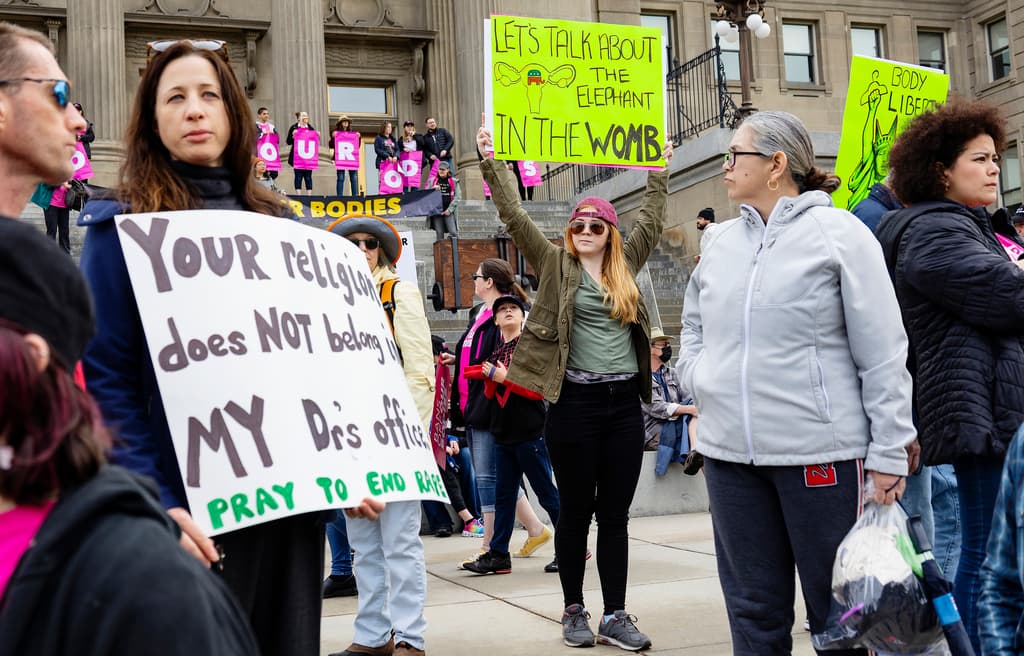Appeals Court Reinstates Idaho’s ‘Abortion Trafficking’ Law
The law makes it illegal to transport a minor out of state to get an abortion without her parents’ consent.

Idaho’s first-in-the-nation law aimed at preventing adults from “transporting” minors out of state to get abortions without parental consent can be enforced, after a panel of judges on a federal appeals court reinstated it this week.
Under the state’s so-called “abortion trafficking law,” individuals convicted of helping minors leave the state for an abortion or obtaining abortion pills without their parents’ consent could face up to five years in prison They can also be sued by the minor’s parents.
It was put on hold in November 2023 by a federal judge, Debora K. Grasham, over concerns that a portion of the law violated the First Amendment. Judge Grasham said a part of the law that prohibits “recruiting” related to abortion procedures could impact a “large swath of expressive activities” such as “encouragement, counseling, and emotional support” and violate free speech rights.
However, in a ruling on Monday, a three-judge panel on the Ninth Circuit of the United States Court of Appeals concluded that most of the law can be reinstated. The judges agreed that the portion of the law about recruiting cannot be enforced.
The ruling was written by a President Clinton appointee, Judge Margaret McKeown, and was joined by a President Obama appointee, John Owens.
Judge McKeown wrote in the ruling that the recruiting provision is “neither integral nor indispensable” to the law and, therefore, can be severed from it while the rest of the law can be enforced.
“Without the ‘recruiting’ prong, the statute criminalizes ‘harboring’ or ‘transporting’ a minor to procure an abortion with the intent to conceal the abortion from the parents or guardian of the minor — an intelligible crime that reaches the problems the legislature sought to rectify,” she said.
Lawyers for the state argued before the court that the recruiting provision is not a restriction of speech. Instead, they said it was designed to prevent “strange adults” from recruiting minors to travel out of state to get an abortion.
The judges rejected the plaintiff’s argument that the law violates their right to free association. Judge McKeown said individuals are still allowed to engage in “general advocacy” about abortion in Idaho and to ask for donations.
An appointee of President George W. Bush, Judge Carlos Bea, concurred with the ruling but dissented on the question of whether the plaintiffs had standing in the case.
The attorney general of Idaho, Raúl Labrador, said in a statement that letting the “trafficking” law go into effect“is a tremendous victory for Idaho and defending the rule of law as written by the people’s representatives.”
“Idaho’s laws were passed specifically to protect the life of the unborn and the life of the mother. Trafficking a minor child for an abortion without parental consent puts both in grave danger, and we will not stop protecting life in Idaho,” Mr. Labrador said.
The director of Planned Parenthood Alliances Idaho, Mistie DelliCarpini-Tolman, celebrated the decision by the appeals court to prevent enforcement of the recruitment provision.
However, she said in a statement, “We need to call this ban what it is — a minor travel ban made possible by gross government overreach and invasion of privacy that goes against our American democratic principles.
AG Labrador’s claim that this ban ‘protects mothers’ is pure hypocrisy and couldn’t be further from the truth: this bill hurts the very people it aims to protect, the young people of Idaho.”
Idaho’s ban on abortions makes it a felony to provide one unless the life of the mother is at risk. That law is facing a legal challenge, though the Supreme Court allowed it to go into effect last January until the case is decided.

